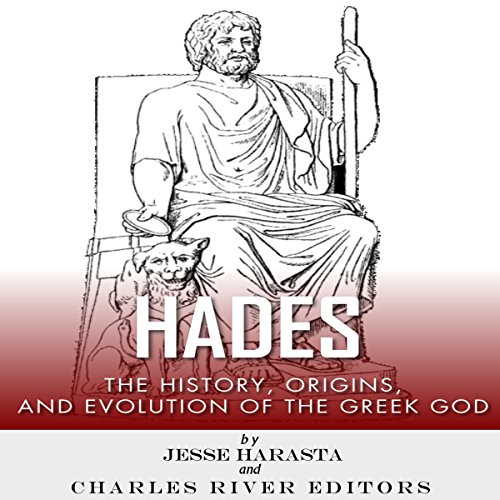
Hades: The History, Origins and Evolution of the Greek God
No se pudo agregar al carrito
Add to Cart failed.
Error al Agregar a Lista de Deseos.
Error al eliminar de la lista de deseos.
Error al añadir a tu biblioteca
Error al seguir el podcast
Error al dejar de seguir el podcast
 Exclusivo para miembros Prime: ¿Nuevo en Audible? Obtén 2 audiolibros gratis con tu prueba.
Exclusivo para miembros Prime: ¿Nuevo en Audible? Obtén 2 audiolibros gratis con tu prueba.Compra ahora por $5.80
-
Narrado por:
-
Michael Gilboe
"The gloomy Hades enriches himself with our sighs and our tears!" - Sophocles
The Greek god Hades is something of an enigma. On the one hand, people can view him through a lens that was a byproduct of the Christian tradition: as a terrifying lord of death seated upon his ebony throne, an unseen force of power moving through the world. Certainly, many of the ancient Greeks themselves saw the god in this light. They whispered his name and made sacrifices of black sheep on dark nights, allowing the blood to trickle down into the earth to reach the underworld. On the other hand, there is a parallel Greek tradition that depicts Hades as a regal god and more of a dark parallel to his brother Zeus, who bears the same icons of sovereignty and may have some deep link to him in a primordial sense.
The name "Hades" literally means "unseen", but the Greeks had a superstitious fear of calling Hades by his proper name and thus created numerous ways of referring to the god. For instance, "Euboleus" means "giver of good counsel" and "Polydectes" means "he who receives many". "Stygeros" means "hateful one". "Polydegmons" means either "grey man" or "hospitable one". The most popular name was "Plouton" which means "wealth-giver". It referred to Hades' role in guarding the treasures of the earth. That name was eventually adopted and altered by the Romans to become their god "Pluto". Other names used for the god included Aidoneus, Ais, Clymenus, and Pylartes.
©2012 Charles River Editors (P)2015 Charles River EditorsLos oyentes también disfrutaron:




















Informative. Wish there was more.
Se ha producido un error. Vuelve a intentarlo dentro de unos minutos.
Would you recommend this book to a friend? Why or why not?
Not really. It was okay, but not entirely enjoyable.Who would you have cast as narrator instead of Michael Gilboe?
Someone better at pronouncing Greek names and words in general. His manner of speaking was distracting and he sometimes pronounced words in such a strange way that I had to stop the book in order to figure out what he was trying to say.Do you think Hades: The History, Origins and Evolution of the Greek God needs a follow-up book? Why or why not?
Yes, this book only gives a brief overview of the many aspects of Hades character and his role in Greek beliefs. Its a good start for a novice, but nothing groundbreaking was said.Okay, but not great.
Se ha producido un error. Vuelve a intentarlo dentro de unos minutos.
Great resource for learning about Hades
Se ha producido un error. Vuelve a intentarlo dentro de unos minutos.


